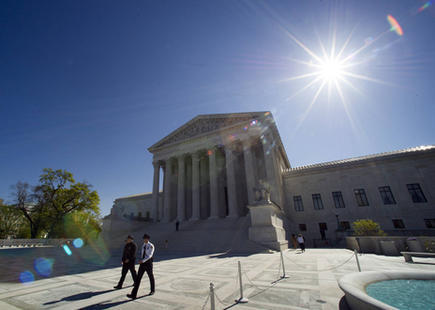
Both those who support and those who oppose same-sex marriage should celebrate the recent Supreme Court decision on same-sex marriage. Contrary to widespread speculation and hysteria, the Court did not say all clergy need to officiate at same-sex ceremonies. They did not reject our society's commitment to "biblical marriage." They did not open the door to polygamy. Rather, they said government cannot privilege one view of marriage over another. They affirmed the principled separation of church and state.
Rather than portend a new dark era for religion, as my debating opponent on Fox News warned on Friday
, the decision reminds us of why religious life flourishes in America. It flourishes because of its independence. It flourishes because it does not count on the government for validation or guidance.
Many of the more conservative religious groups in the country seem to have forgotten this truth. Their forebears never did. Southern Baptists were among the most vigorous proponents of a separation between religion and government in early America. Instead of bemoaning this decision, those who oppose same-sex marriage should remind themselves of why religious freedom matters today.
1. It protects unpopular beliefs: The impetus for the original Religious Freedom Restoration Act in 1993 was the use of peyote by a Native American tribe. Congress --which tends not to favor drug use -- passed the law in part to protect the tribe's use of the drug as part of its religious ritual.
This is not the only one instance of religious groups diverging from the wider culture. In America, they have historically served as a counter-cultural voice. Sometimes they were right -- witness the civil rights movement and the end of legalized segregation. Sometimes they were wrong -- witness the resistance to teaching evolution. Religious belief has never been subject to the rule of the majority, and I think the vast majority of Americans would agree it should not be.
2. It reflects the best of America: America was born out of a desire for religious freedom. The Puritans left England because they could not freely practice their religion. Faith has inspired and motivated some of our country's greatest leaders and achievements.
Part of the reason faith remains strong in America is because it is not regulated by government. The government does not decide what religious groups can and cannot do. This independence encourages creativity, entrepreneurship and renewal. I made this point repeatedly on television on Friday
after the decision.
In Europe, where religion is subsidized, faith groups have become largely irrelevant. Many churches have become museums or concert halls. In America our freedom preserves our ability to grow, evolve and contribute to our country's cultural, moral and political landscape.
Those who oppose same-sex marriage could respond to the Court's decision by reinvigorating the institution of marriage in their churches and communities. Their feeling of assault could translate into renewal. Independence, in other words, should spur creativity, not despair.
3. It allows minorities to flourish: Jews are history's quintessential victims of religious persecution. Yet, over time, we have grown and thrived. Religious liberty has allowed us -- and every other of our nation's more than 2000 religious groups-to live freely, maintaining a commitment to our beliefs, customs and traditions.
The Supreme Court's decision is not an example of government overreach. It is not example of political coercion. Those who propound this point of view are fear-mongering Rather, both those who support and those who oppose same-sex marriage can thank the Court for reminding us that the business of government is not to tell us who we can and cannot marry. It is to allow us to live freely by our values and our conscience. Learn more on this video
.
